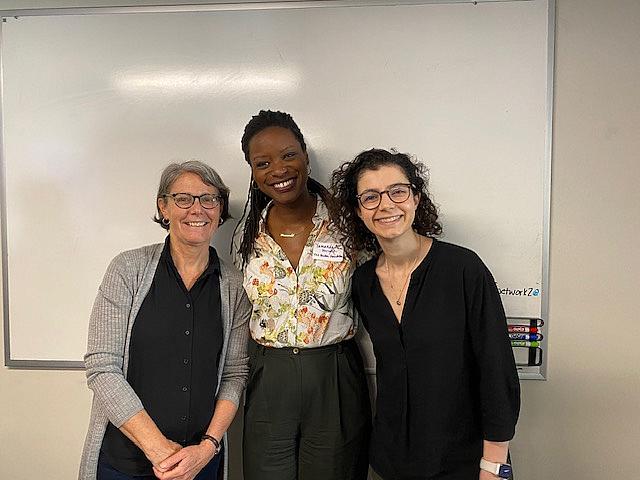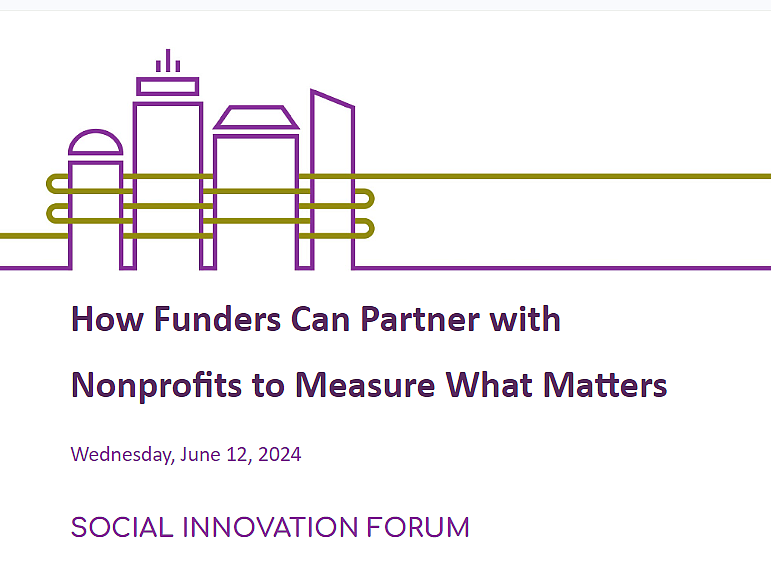

On June 12, 2024, SIF hosted a workshop for funders, “How Funders Can Partner with Nonprofits to Measure What Matters.” We focused on this topic with funders as a way to learn more about how to tangibly leverage data and measurement in service of trusting partnerships.

Speaker Yamanda Wright, and Speaker Andrea Prado Tuma
Facilitator Julia Gittleman of Mendelsohn, Gittleman & Associates led our participants and was joined by two guest speakers from the field, Andrea Prado Tuma of the Barr Foundation and Yamanda Wright of The Boston Foundation. With active participation from the group of nearly twenty funders, we discussed ways to engage in evaluation and measurement in partnership with nonprofits to truly measure what matters.
Many of our facilitator’s recommendations stem from trust-based philanthropy best practices, which shift power towards equity goals and reduce unnecessary burdens on nonprofit leaders. Trust-based philanthropy is not only imperative from a justice perspective, but also encourages strategic shifts that encourage funders to recognize the value of nonprofit leaders’ time, experiences, and expertise.
Our measurement workshop yielded much generative discussion, and many key takeaways. The following recommendations will support funders looking to embrace more trust-based practices as they engage in measurement practices with their nonprofit applicants and partners.
Key Takeaways
Using Data
- Nonprofit organizations can collect several types of data:
- Quantitative and qualitative data that can tell stories of the nonprofit’s impact in different ways.
- Process data is descriptive and describes who is participating in the programming and what is happening.
- Output data describes how much or how many (such as number of participants in a given program).
- Outcome data measures the change or impact such as a knowledge or skills change, attitude change, or behavior change.
- Funders can use data for learning instead of using data for proving. If nonprofits are pressured to “prove” their value to funders through data, the power dynamic becomes more pronounced. When data and measurement are used in pursuit of learning, both funders and nonprofits are focused on the mission, instead of accountability for the sake of accountability. Funders can ask their grantees questions such as, “How does this data inform your future programming?” and other questions aimed towards supporting the nonprofits as they better understand how to achieve their desired impact. Focusing on learning reminds funders and nonprofits that they both seek positive social impact, and grants both parties the opportunity to review a more complete data story.
Effectively Partnering with Nonprofits
- Ask nonprofit leaders what data is most important and useful to them. Listening to nonprofit leaders is a way to value their expertise to see what matters to them as they strive towards their mission. By following the lead of nonprofit leaders, funders can develop meaningful metrics, even if they aren’t as common across grantees as would be convenient.
- Funders should reflect on the questions they pose to grantees and ensure they have reasonable asks. Even funders cannot causally connect their work to system outcomes, so asking a grantee to do so is unrealistic.
- Don’t underestimate the significance of staff and skills needed to manage data and measurement systems. Nonprofits have the pressures of limited time, resources, and technical skills. Funders should consider the cost of fulfilling elaborate measurement requests and the nonprofit staff capacity to engage in that work. By taking these factors into consideration and by accounting for that cost in grant amounts, funders can take actionable steps to reasonably match measurement capacity.
- More data is not necessarily better data. Funders should avoid putting nonprofits into data overload, and instead support grantee capacity building around data and measurement.
- Be open minded and think creatively when it comes to asking for and receiving information. When nonprofits spend their time on detailed written grant reports specific to each funder, that is time they are spending away from programming work. A conversation could be substituted for a detailed report so that funders can learn more about the nonprofit’s progress and ask pertinent questions in real time without placing too much of an additional burden on nonprofit staff.
Embracing Equitable Practices Among Funders
- Funders operate within complex systems as well, complete with their own power dynamics. It is important to expectation set with senior leadership to ensure everyone is on the same page, even if there can’t be complete satisfaction.
- Support the development of Communities of Practice so that funders can continue to learn and improve together. Growth does not happen in isolation, so find others involved in trust-based measurement practices to exchange ideas and elevate best practices.
We at SIF are so grateful for the funders who came to learn, and to our facilitator and speakers who came to share. We are hopeful that our participants will embrace many of these practices to foster trusting relationships with their nonprofit partners.

Further Reading on the Value of Trust-Based Philanthropic Practices
- “The Strategic Value of Trust-Based Philanthropy” (Stanford Social Innovation Review)
- “The Trust-Based Philanthropy Conundrum: Toward Donor-Doer Relationships That Drive Impact” (The Bridgespan Group)
About the Author:
Carina Traub is the Funder Learning Manager at the Social Innovation Forum, where she plans programming for funders. She has a deep appreciation for equitable partnerships and is eager to shift power dynamics together.
“How Funders Can Partner with Nonprofits to Measure What Matters” was an SIF Funder Learning event in June 2024. Our Funder Learning programming is focused on engaging the funder community in continued learning about how to be more equitable partners with community-led nonprofits.
 Social Innovation Forum
Social Innovation Forum